Beşiktaş J.K.
Beşiktaş Jimnastik Kulübü (English: Beşiktaş Gymnastics Club), also known simply as Beşiktaş (Turkish pronunciation: [beˈʃiktaʃ]), is a Turkish sports club founded in 1903, and based in the Beşiktaş district of Istanbul, Turkey. The club's football team is one of the most successful teams in Turkey, having never been relegated to a lower division. The team last won the Turkish Süper Lig championship during the 2016–17 season. The home ground of Beşiktaş is Vodafone Park, a 41,903 capacity all-seater stadium located next to Dolmabahçe Palace.
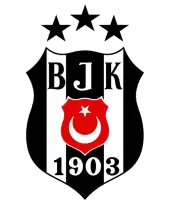 | ||||
| Full name | Beşiktaş Jimnastik Kulübü[1] | |||
|---|---|---|---|---|
| Nickname(s) | Kara Kartallar (Black Eagles)[2][3] Siyah Beyazlılar (Black and Whites) | |||
| Short name | BJK | |||
| Founded | 3 March 1903 as Beşiktaş Bereket Jimnastik Kulübü[4] | |||
| Ground | Vodafone Park, Beşiktaş, Istanbul | |||
| Capacity | 41,903 | |||
| President | Ahmet Nur Çebi[5][6] | |||
| Head coach | Sergen Yalçın | |||
| League | Süper Lig | |||
| 2019–20 | Süper Lig, 3rd | |||
| Website | Club website | |||
|
| ||||
The club also competes in other branches including basketball, volleyball, handball, athletics, boxing, wrestling, chess, bridge, gymnastics, rowing, table tennis, parasports, esports, and beach football.[7]
History
| Active departments of Beşiktaş J.K. | ||
|---|---|---|
| Athletics | Basketball (Men's) (Women's) |
Boxing |
| Bridge | Chess | e-Sports |
| Football (Men's) (Women's) |
Gymnastics | Handball (Men's) |
| Rowing | Table tennis | Volleyball (Men's) (Women's) |
| Wheelchair basketball | Wrestling | |
Establishment of the club
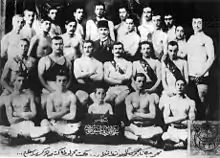
Bereket Gymnastics Club was founded on 3 March 1903 under special permission from the authorities.[8] Their sporting activities gained more freedom with the declaration of the Constitutional Monarchy in 1908. After the political events of 31 March 1909, Fuat Balkan and Mazhar Kazancı, who were in Edirne, came to Istanbul with the Movement Army. After the restoration of political order, Fuat Balkan, a proven fencing coach, and Mazhar Kazancı, a good wrestler and weight lifter, found the youths involved in gymnastics in Serencebey and persuaded them to train together. Refik and Şerafettin Beys, friends of Fuat Bey, were also good fencers. Fuat Balkan made the first floor of his home in Ihlamur the Club's headquarters, and the title of Bereket Gymnastics Club was changed to Beşiktaş Ottoman Gymnastics Club. Thus, a stronger sports club, where gymnastics, wrestling, boxing, fencing and athletics were emphasized, was formed. Founding member Mehmet Şamil Şhaplı was elected the first president of the club.[9]
In the meantime, Beşiktaş Ottoman Gymnastics Club became the first registered Turkish sports club on 13 January 1910 with the encouragement of Beyoğlu Governor Muhittin Bey. The interest among the youths of the neighbourhood in the sports club grew and the number of members involved in sports quickly grew to 150. The headquarters of the club was moved from Ihlamur to Building 49 in Akaretler. When this building became too small, Building 84, also in Akaretler, became their headquarters. The yard behind this building was turned into a sports pitch.
Some of the young patriots from the Beşiktaş district of Istanbul formed two football clubs called "Valideçeşme" and "Basiret" under the leadership of Şeref Bey. The Valideçeşme and Basiret football clubs joined under the roof of Beşiktaş Ottoman Gymnastics Club in 1911. In a very short time, football became the foremost branch in the club.
For years, the original colours of Beşiktaş were believed to be Red and White; and then temporarily changed into Black and White as a sign of mourning for the dead in the Balkan Wars, which included some players of the club. Although most written sources endorse this claim, a detailed study carried out for Beşiktaş's 100th anniversary documentary had shown that red was never used in club's first colors; and Beşiktaş's colours were always Black and White.[10]
Initial years of football
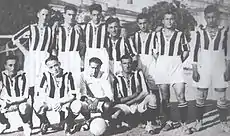
With football becoming the main sport of the Ottoman Empire around 1910, Beşiktaş members slowly started to give more attention to football. In August 1911, Ahmed Şerafettin started the football team. With the outbreak of World War I following the Balkan Wars, sporting activities at the club effectively came to a halt as many athletes left to serve on the front lines.[11] While the end of the war allowed surviving athletes to return, the team faced a difficult period during the Occupation of Istanbul, but was able to recover with the hard work of Şeref Bey.[12] Beşiktaş did not enter the Istanbul Friday and Sunday leagues, and did not have any championships until 1918, when they won the Istanbul Turkish 1st Sports League. In 1921, that particular league's final season, they won it again. In 1924, Beşiktaş entered the Istanbul Football League along with Galatasaray, Fenerbahçe and other Istanbul teams. Beşiktaş became the league's first champion in 1924, but was not able to have more success in the league. Galatasaray and Fenerbahçe were the two dominant teams through the middle of the 1930s.
Beşiktaş won their second Istanbul League championship in 1934, as well as their first Turkish Football Championship in the same year. In 1937, the Turkish National League was formed. In the Istanbul League season prior to the National League's inaugural season, Beşiktaş finished in fourth place, which earned them a berth in the National League. Beşiktaş finished third place in the National League, behind Fenerbahçe and Galatasaray. In 1938, Beşiktaş finished in third place in the Istanbul League and second place in the National League, behind Güneş. Beşiktaş won a record five consecutive Istanbul League championships between 1939 and 1943. In the National League, Beşiktaş finished fourth in 1939, fifth in 1940, first in 1941 and third in 1943 (in 1942 the league was not held). The club won the Istanbul League in 1945 and 1946, as well as the national league in 1944 and 1947.
From Milli Lig to Süper Lig
In 1959, the Turkish First League was formed, the nation's first professional football league. In the inaugural year, Beşiktaş came in third place, while in 1960 it won the league title. In 1960, the club also participated in the European Cup, becoming the first Turkish team ever to participate in the tournament. In subsequent years, Beşiktaş finished third in both 1961 and 1962, as well as second in 1963, 1964 and 1965. In 1966 and 1967, meanwhile, the club won back-to-back championship titles, and in the latter year, they also won their first Turkish Super Cup. In 1968, Beşiktaş finished second.
After 1967, Beşiktaş's performance declined slightly, finishing in 8th, 12th, 5th, 4th many times, while Trabzonspor, Fenerbahçe and, occasionally Galatasaray continued their success. Beşiktaş only finished in second place once in the decade, in 1975.
Beşiktaş put an end to their poor performances in 1982 with a surprise Turkish championship, earning another in 1986. They finished the league as runners-up four times in the second half of the decade. Hooliganism was a major problem that had started in Europe and had also spread throughout Turkey. Beşiktaş fan hooliganism had been an issue with many fights inside and outside the stadium, although this has become less of an issue in more recent years.
Gordon Milne era: 1987–1993
Beşiktaş had their most successful run in the Süper Lig with three consecutive championships under the management of Gordon Milne in the early 1990s. Three players of the squad – Metin Tekin, Ali Gültiken and Feyyaz Uçar – were notable for significant contributions to the team during this period. These players had been called Metin-Ali-Feyyaz ("MAF") and they formed the front of the team's line-up. The supporters composed various chants for the trio devoted to their delighting style on the pitch, their goals, and above all for their friendship and modesty. The trio is regarded by supporters as the best ever attacking line of the club.
The only three-in-a-row title term in club history occurred in the 1989–90, 1990–91 and 1991–92 seasons. Most notably, Beşiktaş became the first and only undefeated champions in Süper Lig history.[13][14]
Under Milne, the team adopted the 4–4–2 system. By playing down the lines, crossing and winning balls in the air, the team were in fine form and scored many goals. On 15 October 1989, Beşiktaş broke the Süper Lig record for the biggest winning margin in a game with a 10–0 victory over Southern Turkey team Adana Demirspor.[15] This match was designated as one of the 16 biggest matches in club history.[16]
Recent years
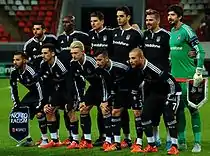
Beşiktaş won the 1994–95 1.Lig with the German coach Christoph Daum. Their next league title was in 2002–03 with the Romanian coach Mircea Lucescu, they also reached the quarter-finals of the 2002–03 UEFA Cup. In 2008–09 season, Beşiktaş won the league with coach Mustafa Denizli.
Later on, Beşiktaş won the league twice in 2015–16 and 2016–17; in addition, they reached the 2016–17 UEFA Europa League quarter-finals for the second time, and the 2017–18 UEFA Champions League round of 16 for the first time in their history.[17]
Nicknames
There is a legend surrounding the nicknaming of the team as "The Black Eagles". Beşiktaş, the title holder of the previous two seasons, started the 1940–41 season with a young and renewed team. As the weeks went by, the team had built up a sizeable lead at the top of the league table. With five weeks remaining in the season, the opponent was Süleymaniye. Beşiktaş had started the game in Şeref Stadium on Sunday 19 January 1941, with the following players: Faruk, Yavuz, İbrahim, Rıfat, Halil, Hüseyin, Şakir, Hakkı, Şükrü, Şeref, Eşref. The team went ahead in the first half. Midway through the second half of the game, Beşiktaş attacked continuously, despite being in front. And then, according to legend, a voice was heard from the stands towards which Beşiktaş was attacking. The voice said, "Come on, Black Eagles! Attack, Black Eagles!" The story goes that the owner of the voice from the stands was a fisherman called Mehmet Galin. Beşiktaş finished the game with a 6–0 win. The Beşiktaş players, who had very successfully defeated their opponents that season, were being described as "Black Eagles", and the football they played was being compared to "Attacking like Black Eagles". The comparison resonated with the team and the fans, and so it was adopted by the Beşiktaş community as their team's nickname.[18]
Stadium
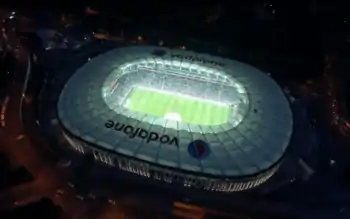
Beşiktaş play their home games at Vodafone Park. Completed in 2016, it was built on the site of Beşiktaş's former home, BJK İnönü Stadium.
Honours
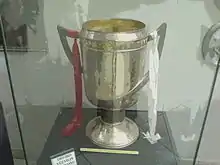
National Championships
National Cups
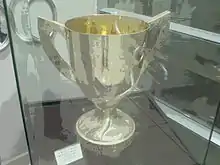
Minor competitions
- Alpen Cup
- Winners (1): 2004
- Efes Cup
- Winners (1): 2006
- Soma Tournament
- Winners (1): 2014
- Royal Cup
- Winners (1): 2015
UEFA achievements
- European Cup/UEFA Champions League
- Quarterfinals: 1986–87
- UEFA Cup/UEFA Europa League
Others
- Turkish Amateur Football Championship
- Winners: 1985, 1988
- TSYD Cup
- Winners (12) (shared-record): 1964–65, 1965–66, 1971–72, 1972–73, 1974–75, 1983–84, 1984–85, 1988–89, 1989–90, 1990–91, 1993–94, 1996–97
- Prime Minister's Cup
- Winners (6): 1944, 1947, 1974, 1977, 1988, 1997
- Runners-up: 1987, 1996
- Istanbul Football League
Recent seasons
| Season | Div. | Pos. | Pl. | W | D | L | GS | GA | P | Cup | Europe | Manager | |
|---|---|---|---|---|---|---|---|---|---|---|---|---|---|
| 2010–11 | SL | 5 | 34 | 15 | 9 | 10 | 53 | 36 | 54 | Winners | UEL | Round of 32 | Bernd Schuster/Tayfur Havutçu |
| 2011–12 | SL | 4 | 34+6 | 15+1 | 9+2 | 10+3 | 50+5 | 39+9 | 54+5 | Round of 16 | UEL | Round of 16 | Carlos Carvalhal/Tayfur Havutçu |
| 2012–13 | SL | 3 | 34 | 16 | 10 | 8 | 63 | 49 | 58 | Round of 16 | — | Samet Aybaba | |
| 2013–14 | SL | 3 | 34 | 17 | 11 | 6 | 53 | 33 | 62 | Round of 32 | UEL | Play-off | Slaven Bilić |
| 2014–15 | SL | 3 | 34 | 21 | 6 | 7 | 55 | 32 | 69 | Round of 16 | UCL UEL | Play-off Round of 16 | |
| 2015–16 | SL | 1 | 34 | 25 | 4 | 5 | 75 | 35 | 79 | Quarter-finals | UEL | Group Stage | Şenol Güneş |
| 2016–17 | SL | 1 | 34 | 23 | 8 | 3 | 73 | 30 | 77 | Round of 16 | UCL UEL | Group Stage Quarter-finals | |
| 2017–18 | SL | 4 | 34 | 21 | 8 | 5 | 69 | 30 | 71 | Semi-finals | UCL | Round of 16 | |
| 2018–19 | SL | 3 | 34 | 19 | 8 | 7 | 72 | 46 | 65 | — | UEL | Group Stage | |
| 2019–20 | SL | 3 | 34 | 19 | 5 | 10 | 59 | 40 | 62 | Round of 16 | UEL | Group Stage | Abdullah Avcı/Sergen Yalçın |
Last updated: 1 August 2020
Div.=Division; Pos.=Position; Pl=Match played; W=Won; D=Drawn; L=Lost; GS=Goals scored; GA=Goals against; P=Points
SL=Süper Lig; UCL=UEFA Champions League; UC=UEFA Cup; UEL=UEFA Europa League; Cup=Turkish Cup
Background colours: Gold=winners; Silver=runners-up; Bronze=third
European record
Statistics
- As of 25 August 2020[19]
| Competition | Played | Won | Drew | Lost | GF | GA | GD | Win% |
|---|---|---|---|---|---|---|---|---|
| European Cup / Champions League | 83 | 27 | 19 | 37 | 86 | 134 | −48 | 32.53 |
| Cup Winners' Cup | 20 | 4 | 4 | 12 | 21 | 38 | −17 | 20.00 |
| UEFA Cup / UEFA Europa League | 120 | 53 | 23 | 44 | 188 | 154 | +34 | 44.17 |
| Total | 223 | 84 | 46 | 93 | 295 | 326 | −31 | 37.67 |
Legend: GF = Goals For. GA = Goals Against. GD = Goal Difference.
UEFA club coefficient ranking
- As of 26 July 2020[20]
| Rank | Team | Points |
|---|---|---|
| 41 | 33.000 (+14.666 National Association Contribution) | |
| 42 | 40.000 | |
| 43 | 38.000 | |
| 44 | 37.500 | |
| 45 | 30.000 |
Players
Current squad
Note: Flags indicate national team as defined under FIFA eligibility rules. Players may hold more than one non-FIFA nationality.
|
|
Out on loan
Note: Flags indicate national team as defined under FIFA eligibility rules. Players may hold more than one non-FIFA nationality.
|
|
Other players under contract
Note: Flags indicate national team as defined under FIFA eligibility rules. Players may hold more than one non-FIFA nationality.
|
|
Coaching staff
| Position | Staff |
|---|---|
| Head Coach | |
| Assistant Coach | |
| Assistant Coach | |
| Goalkeeper Coach | |
| Fitness Coach | |
| Analyst | |
| Scout | |
| Scout | |
Coaching history
There have been coaches from various European countries at the helm of the club. The longest serving coach of Beşiktaş is Şeref Bey, coaching the club for 14 years. The most successful coach is Gordon Milne, winning the league three times in a row along with other trophies as well.[25]
 Şeref Bey (1911–25)
Şeref Bey (1911–25) Imre Zinger (1925–35)
Imre Zinger (1925–35) Refik Osman Top (1935–44)
Refik Osman Top (1935–44) Charles Howard Slade (1944–46)
Charles Howard Slade (1944–46) Refik Osman Top (1946–48)
Refik Osman Top (1946–48) Giuseppe Meazza (1948–49)
Giuseppe Meazza (1948–49) Hakkı Yeten (1949)
Hakkı Yeten (1949) Eric Keen (1949–50)
Eric Keen (1949–50) Hakkı Yeten (1950–51)
Hakkı Yeten (1950–51) Alfred Cable (1951–52)
Alfred Cable (1951–52) Sadri Usuoğlu (1952–53)
Sadri Usuoğlu (1952–53) Sandro Puppo (1 July 1953 – 30 June 1954)
Sandro Puppo (1 July 1953 – 30 June 1954) Cihat Arman (1955–56)
Cihat Arman (1955–56) József Mészaros (1 July 1956 – 30 June 1957)
József Mészaros (1 July 1956 – 30 June 1957) Esref Bilgiç (1957)
Esref Bilgiç (1957) Leandro Remondini (1 July 1957–31 Dec. 1958)
Leandro Remondini (1 July 1957–31 Dec. 1958) Hüseyin Saygun (1959)
Hüseyin Saygun (1959) András Kuttik (1 July 1959 – 30 June 1960)
András Kuttik (1 July 1959 – 30 June 1960) Sandro Puppo (1 July 1960 – 30 June 1961)
Sandro Puppo (1 July 1960 – 30 June 1961) Şeref Görkey (1961)
Şeref Görkey (1961) András Kuttik (1 July 1961 – 30 June 1962)
András Kuttik (1 July 1961 – 30 June 1962).svg.png.webp) Ljubiša Spajić (1 July 1962 – 30 June 1963)
Ljubiša Spajić (1 July 1962 – 30 June 1963) Ernst Melchior (1963–64)
Ernst Melchior (1963–64).svg.png.webp) Ljubiša Spajić (1 July 1964 – 30 June 1967)
Ljubiša Spajić (1 July 1964 – 30 June 1967).svg.png.webp) Jane Janevski (1967–68)
Jane Janevski (1967–68) Krum Milev (1968–69)
Krum Milev (1968–69).svg.png.webp) Milovan Ćirić (1969–70)
Milovan Ćirić (1969–70) Dumitru Teodorescu (1970–71)
Dumitru Teodorescu (1970–71) Gündüz Kılıç (1971–72)
Gündüz Kılıç (1971–72).svg.png.webp) Abdulah Gegić (1 July 1972–73)
Abdulah Gegić (1 July 1972–73) Metin Türel (1973–74)
Metin Türel (1973–74) Horst Buhtz (1974–75)
Horst Buhtz (1974–75) Gündüz Tekin Onay (1975–76)
Gündüz Tekin Onay (1975–76) İsmet Arıkan (1977)
İsmet Arıkan (1977).svg.png.webp) Miloš Milutinović (1 July 1977 – 30 June 1978)
Miloš Milutinović (1 July 1977 – 30 June 1978) Doğan Andaç (1978–79)
Doğan Andaç (1978–79) Serpil Hamdi Tüzün (1979–80)
Serpil Hamdi Tüzün (1979–80) Metin Türel (1980)
Metin Türel (1980).svg.png.webp) Đorđe Milić (1 July 1980 – 30 June 1983)
Đorđe Milić (1 July 1980 – 30 June 1983) Ziya Taner (1983–84)
Ziya Taner (1983–84).svg.png.webp) Branko Stanković (1 July 1984 – 30 June 1986)
Branko Stanković (1 July 1984 – 30 June 1986).svg.png.webp) Miloš Milutinović (1 July 1986 – 30 June 1987)
Miloš Milutinović (1 July 1986 – 30 June 1987) Gordon Milne (1 July 1987 – 31 December 1993)
Gordon Milne (1 July 1987 – 31 December 1993) Christoph Daum (6 January 1994 – 6 May 1996)
Christoph Daum (6 January 1994 – 6 May 1996) Rasim Kara (2 July 1996 – 30 June 1997)
Rasim Kara (2 July 1996 – 30 June 1997).svg.png.webp) John Toshack (1 July 1997 – 23 February 1999)
John Toshack (1 July 1997 – 23 February 1999) Karl-Heinz Feldkamp (24 Feb.–15 Sept. 1999)
Karl-Heinz Feldkamp (24 Feb.–15 Sept. 1999) Hans-Peter Briegel (16 Sept. 1999–30 June 2000)
Hans-Peter Briegel (16 Sept. 1999–30 June 2000) Nevio Scala (1 July 2000 – 6 March 2001)
Nevio Scala (1 July 2000 – 6 March 2001) Christoph Daum (7 March 2001 – 11 May 2002)
Christoph Daum (7 March 2001 – 11 May 2002) Mircea Lucescu (1 July 2002 – 1 May 2004)
Mircea Lucescu (1 July 2002 – 1 May 2004) Vicente del Bosque (8 June 2004–27 Jan. 2005)
Vicente del Bosque (8 June 2004–27 Jan. 2005) Rıza Çalımbay (1 February–17 October 2005)
Rıza Çalımbay (1 February–17 October 2005) Jean Tigana (31 October 2005 – 21 May 2007)
Jean Tigana (31 October 2005 – 21 May 2007) Ertuğrul Sağlam (6 July 2007 – 7 October 2008)
Ertuğrul Sağlam (6 July 2007 – 7 October 2008) Mustafa Denizli (9 October 2008 – 4 June 2010)
Mustafa Denizli (9 October 2008 – 4 June 2010) Bernd Schuster (1 July 2010 – 15 March 2011)
Bernd Schuster (1 July 2010 – 15 March 2011) Tayfur Havutçu (17 March–13 July 2011)
Tayfur Havutçu (17 March–13 July 2011) Roland Koch (interim) (14 July–1 August 2011)
Roland Koch (interim) (14 July–1 August 2011) Carlos Carvalhal (2 August 2011 – 2 April 2012)
Carlos Carvalhal (2 August 2011 – 2 April 2012) Tayfur Havutçu (2012)
Tayfur Havutçu (2012) Samet Aybaba (16 June 2012 – 27 May 2013)
Samet Aybaba (16 June 2012 – 27 May 2013) Slaven Bilić (26 June 2013 – 31 May 2015)
Slaven Bilić (26 June 2013 – 31 May 2015) Şenol Güneş (1 July 2015 – 24 May 2019)
Şenol Güneş (1 July 2015 – 24 May 2019) Abdullah Avcı (1 June 2019 – 24 January 2020)
Abdullah Avcı (1 June 2019 – 24 January 2020) Sergen Yalçın (29 January 2020 – present)
Sergen Yalçın (29 January 2020 – present)
Presidential History
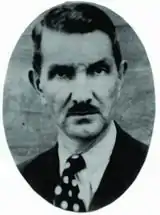
- 1903–08 Mehmet Şamil Şhaplı
- 1908–11 Şükrü Paşa
- 1911–18 Fuat Paşa
- 1918–23 Fuat Balkan
- 1923–24 Salih Bey
- 1924–26 Ahmet Fetgeri Aşeni
- 1926–28 Fuat Balkan
- 1928–30 Ahmet Fetgeri Aşeni
- 1930–32 Emin Şükrü Kunt
- 1932–35 Abdülkadir Karamürsel
- 1935–38 Fuat Balkan
- 1938–39 Abdülkadir Karamürsel
- 1939–41 Yusuf Ziya Erdem
- 1941–42 Abdülkadir Karamürsel
- 1942–50 A. Ziya Kozanoğlu
- 1950 Ekrem Amaç
- 1950–52 Salih Keçeci
- 1952–55 A. Ziya Kozanoğlu
- 1955–56 Tahir Söğütlü
- 1956–57 Danyal Akbel
- 1957 Ferhat Nasır
- 1957–58 Nuri Togay
- 1958 Enver Kaya
- 1958–60 Nuri Togay
- 1960–63 Hakkı Yeten
- 1963–64 Selahattin Akel
- 1964–66 Hakkı Yeten
- 1966–67 Hasan Salman
- 1967–68 Hakkı Yeten
- 1968–69 Talat Asal
- 1969–70 Rüştü Erkuş
- 1970 Nuri Togay
- 1970–71 Agasi Şen
- 1971–72 Himmet Ünlü
- 1972–73 Şekip Okçuoğlu
- 1973–77 Mehmet Üstünkaya
- 1977–79 Gazi Akınal
- 1979 Hüseyin Cevahir
- 1979–80 Gazi Akınal
- 1980–81 Rıza Kumruoğlu
- 1981–84 Mehmet Üstünkaya
- 1984–00 Süleyman Seba
- 2000–04 Serdar Bilgili
- 2004–12 Yıldırım Demirören
- 2012–19 Fikret Orman
- 2019– Ahmet Nur Çebi
Sponsorships
| Years | Main shirt sponsor | Kit manufacturer |
|---|---|---|
| 1988 | Toshiba | Adidas |
| 1988–1998 | Beko | |
| 1998–2001 | Reebok | |
| 2001–2004 | Puma | |
| 2004–2005 | Turkcell | |
| 2005–2009 | Cola Turka | Umbro |
| 2009–2011 | Adidas | |
| 2011–2014 | Toyota | |
| 2014–2020 | Vodafone | |
| 2020- | Beko |
References
- "Beşiktaş Jimnastik Kulübü Derneği Tüzüğü" (PDF) (in Turkish). p. 1. Archived from the original (PDF) on 2 July 2013. Retrieved 6 September 2013.
- "Kara Kartallar Efsanesi". Beşiltaş JK. 22 October 2004. Retrieved 6 September 2013.
- "Turkey – Club Nicknames". RSSSF. 10 July 2005. Retrieved 8 January 2014.
- "Beşiktaş Jimnastik Kulübü". www.bjk.com.tr.
- Selçuk Genç. "Beşiktaşımızın 34. Başkanı Ahmet Nur Çebi" (in Turkish). Beşiktaş J.K. Archived from the original on 21 October 2019. Retrieved 21 October 2019.
- "Info Bank » Club Details". Turkish Football Federation. Retrieved 21 October 2019.
- "Branches, Football". Beşiktaş club website. Archived from the original on 30 November 2007. Retrieved 2 December 2007.
"Branches, Basketball". Beşiktaş club website. Archived from the original on 1 December 2007. Retrieved 2 December 2007.
"Branches, Volleyball". Beşiktaş club website. Archived from the original on 11 December 2007. Retrieved 2 December 2007.
"Branches, Handball". Beşiktaş club website. Archived from the original on 3 November 2007. Retrieved 2 December 2007.
"Branches, Athletics". Beşiktaş club website. Archived from the original on 3 November 2007. Retrieved 2 December 2007.
"Branches, Boxing". Beşiktaş club website. Archived from the original on 3 November 2007. Retrieved 2 December 2007.
"Branches, Wrestling". Beşiktaş club website. Archived from the original on 3 November 2007. Retrieved 2 December 2007.
"Branches, Chess". Beşiktaş club website. Archived from the original on 3 November 2007. Retrieved 2 December 2007.
"Branches, Cards Bridge". Beşiktaş club website. Archived from the original on 3 November 2007. Retrieved 2 December 2007.
"Branches, Gymnastics". Beşiktaş club website. Archived from the original on 3 November 2007. Retrieved 2 December 2007.
"Branches, Rowing". Beşiktaş club website. Archived from the original on 3 November 2007. Retrieved 2 December 2007.
"Branches, Table Tennis". Beşiktaş club website. Archived from the original on 3 November 2007. Retrieved 2 December 2007.
"Branches, Disabled Sports". Beşiktaş club website. Archived from the original on 3 November 2007. Retrieved 2 December 2007.
"Beşiktaş Beach Football Team is Established". Beşiktaş club website. Retrieved 24 July 2012. - zaman, Yazar : bizim. "Bizimzaman: 4 Martta Neler Oldu? Tarihte 4 Martta Yaşananlar Neler? Tarihte 4 Mart".
- "Beşiktaş J.K. Official Web Site". www.bjk.com.tr. Retrieved 10 March 2018.
- "Beşiktaş J.K. Official Web Site". www.bjk.com.tr.
- "Beşiktaş Jimnastik Kulübü". www.bjk.com.tr. Retrieved 10 March 2018.
- "Beşiktaş Jimnastik Kulübü". www.bjk.com.tr. Retrieved 10 March 2018.
- "1991–92 League Ranking". Retrieved 18 January 2008.
- "1991–92 League Ranking". Turkish Football Association. Retrieved 18 January 2008.
- "Beşiktaş – Adana Demirspor : 10–0". Beşiktaş club website. 1 November 2005. Archived from the original on 24 January 2008. Retrieved 18 January 2008.
- "Basarilarimiz" [Our Achievements]. Beşiktaş club website. Archived from the original on 24 January 2008. Retrieved 18 January 2008.
- "Undefeated Beşiktaş advance to round of 16 in Champions League, beating Leipzig 2-1". Daily Sabah. 7 December 2017.
- "Beşiktaş Karakartal Ambleminin Hikayesi". Delinetciler Portal.
- UEFA club competition record – UEFA.com
- UEFA.com. "Member associations – UEFA Coefficients – Club coefficients". UEFA.
- "A TAKIM". Beşiktaş J.K. Retrieved 27 August 2020.
- "Futbolcularımızın Forma Numaraları Belli Oldu" (in Turkish). Beşiktaş J.K. 26 August 2020. Archived from the original on 27 August 2020. Retrieved 27 August 2020.
- "İşte Sergen Yalçın'ın ekibi" (in Turkish). Cumhuriyet. İhlas News Agency. 28 January 2020. Archived from the original on 26 July 2020. Retrieved 26 July 2020.
- "Sergen Yalçın'ın ekibi belli oldu!" (in Turkish). Hürriyet. 29 June 2020. Archived from the original on 26 July 2020. Retrieved 26 July 2020.
- Teknik Direktörlerimiz Archived 27 September 2007 at the Wayback Machine Beşiktaş JK
External links
| Wikimedia Commons has media related to Beşiktaş J.K.. |
- Official website (in Turkish and English)
- Beşiktaş J.K. at UEFA
- Beşiktaş J.K. at TFF
- Beşiktaş: Istanbul's third club but Constantinople's first at thesefootballtimes.co
